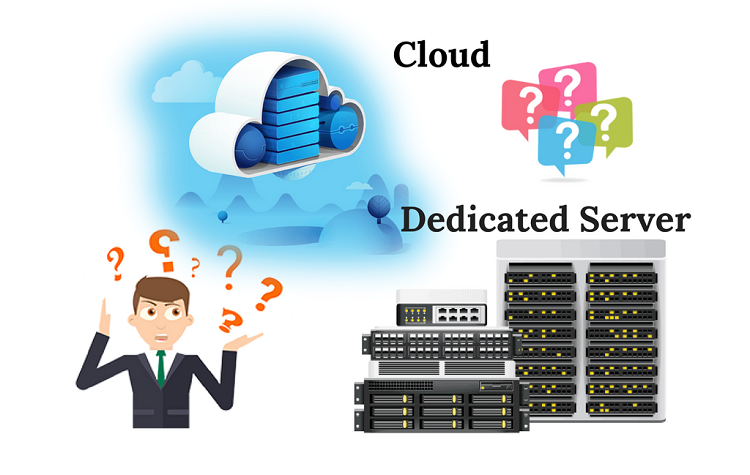Whether you should sign up for a cloud server or a dedicated server is a critical decision and one that you need to make after a lot of deliberation and analysis. Choosing the right web host can be the key to making your business successful. No matter what the hosting plan you have chosen, the ultimate objective is to identify a plan which can offer you a fast performing server so that your customers will find your site up and running 24×7. Even a second’s lag in page-loading speed of a site can cost a business nearly 7% of its clients. Today, businesses seem to be facing a choice between signing up for cloud hosting services and dedicated hosting. The truth is both these hosting solutions are perfect for businesses, which get a lot of web traffic but you, need to consider many factors to be able to make the right choice.
How does a cloud server and a dedicated server work?
The cloud server is a virtualized server and businesses can expect to get computing resources from a huge resource pool that is powered by multiple servers interconnected with one another through a network. Virtual servers can be deployed very quickly and dismissed just as fast. So, these servers are deployed whenever there is a need for them and they do not need in-depth hardware modifications. A dedicated server, on the other hand, is a single server which is dedicated exclusively for one client enterprise. So, all resources belonging to that server can be enjoyed by that specific client alone; there is no need to share resources with anyone else.
 What are the similarities between cloud and dedicated server hosting plans?
What are the similarities between cloud and dedicated server hosting plans?
With both dedicated and cloud server you can store data, receive requests for data, process data and return information to users requesting for it. Both can handle very large volumes of incoming traffic without experiencing frequent bottlenecks, lags and downtimes. When you sign up for both dedicated hosting services and cloud hosting, you will not need to worry about data security. Finally, both these hosting solutions can guarantee stability for a wide variety of applications.
What are the key differences between dedicated hosting and cloud hosting?
Whether you should choose cloud servers or dedicated servers will actually depend on your specific business needs. You must evaluate the distinctions between these two types of servers in terms of factors like scalability, administration, migration, functions and prices.
– There is no arguing the fact that a cloud server is available at all times as there is no single point of failure. In case any one of the servers in the cluster gets overloaded, another server on standby will take over so that there is zero downtime. You can therefore enjoy maximum network uptimes for your applications and websites. However, when you choose a dedicated server, there may be risks of downtime or hardware crashes as there are no other nodes to share the workloads.
– When you sign up for a cloud server you can scale up and scale down the resources like memory, storage, processing power, bandwidth etc easily. However, with a dedicated server there will be strict specifications and resource scaling will take a while.
– When you use cloud servers you will need to put your faith in the cloud services provider for deploying robust security measures to protect data. These cloud providers will do so through encryption, firewalls, dedicated IT supports and efficient backup recovery solutions. In dedicated server hosting, on the other hand, you will have to deploy all these security arrangements to monitor server resources when you sign up for unmanaged hosting plans. You will also be expected to carry out all the necessary upgrades to secure critical business data.
– Perhaps the biggest benefit of choosing a cloud server is cost effectiveness. Most providers follow a pay-as-you-go model where clients only have to pay for resources, which they will be using, and nothing extra. But, with dedicated hosting, you have to pay a hefty price for features which you may or may not use. Dedicated hosting plans will be billed every month and you must pay the exact same amount each month, regardless of resources you really use.
– As far as control goes, a cloud server will not be able to offer you total control over the data and you will have to accept offering by your cloud vendor, even if these are limited in nature. In dedicated hosting, you have root access to the server; you get to enjoy total control over it and you are free to add programs, custom software etc to improve its performance.
So, to sum up, whether you should sign up for a cloud or dedicated server will largely depend on your business needs. More and more companies are preferring cloud servers as this gives them the opportunity to combine workloads in one hardware platform. So, businesses get to cut down on capital and operational costs. A dedicated server will offer access to performance and this may be a deciding factor depending on your workloads. Using a hybrid cloud hosting approach, businesses may run computing-intensive processes on dedicated hardware.
In case of any hosting requirement, you can easily contact us for Hosting Requirement.






 Live Chat
Live Chat
Excellent article. I absolutely love this site. Keep it up!
As a Newbie, I am continuously exploring online for articles that can be of
assistance to me. Thank you
Very soon this web page will be famous amid all blogging and site-building people, due to it’s fastidious articles